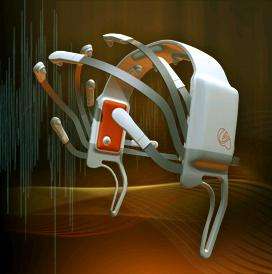March 14, 2008 weblog
'Mind Gaming' Could Enter Market This Year

In an adapted version of the Harry Potter video game, players lift boulders and throw lightning bolts using only their minds. Just as physical movement changed the interface of gaming with Nintendo's Wii, the power of the mind may be the next big thing in video games.
And it may come soon. Emotiv, a company based in San Francisco, says its mind-control headsets will be on shelves later this year, along with a host of novel "biofeedback" games developed by its partners.
Several other companies - including EmSense in Monterey, California; NeuroSky in San Jose, California; and Hitachi in Tokyo - are also developing technology to detect players´ brainwaves and use them in next-gen video games.
The technology is based on medical technology that has been around for decades. Using a combination of EEGs (which reveal alpha waves that signify calmness), EMGs (which measure muscle movement), and ECGs and GSR (which measure heart rate and sweating), developers hope to create a picture of a player´s mental and physical state. Near infrared spectroscopy (NIRS), which monitors changes in blood oxygenation, could also be incorporated since it overcomes some of the interference problems with EEGs.
Right now, getting high resolution readouts in the midst of interference is the greatest challenge for developers. Electric fields produced by nearby electronics and the body´s own muscles (especially the heart), and even blinking can interfere with EEGs. In addition, every individual´s brain activity varies, making it challenging to pinpoint every player´s cognitive state with certainty.
Besides meeting these technical challenges, gaming headsets must also be low-cost and mobile. This means that the gear must be significantly smaller and simpler than the headsets used for medical purposes. For example, while neurologists carefully position about 120 EEG sensors around the scalp, Emotiv´s headset contains 16 sensors, and NeuroSky´s has just one. But the companies say that they don´t need to detect subtle signals, and that basic brainwave activity can serve the needs of mind gaming. NeuroSky claims that its single sensor can tell if a player is focused, relaxed, afraid, or anxious.
In order for mind gaming to attract consumers, developers know they need to offer more than just interesting technology. Earlier biofeedback games - such as Atari´s MinkLink in 1984 and AmTex´s Bio Tetris in 1998 - never took off, possibly because they used old games. This time, developers plan to design novel games that can only be played with mind control complementing a traditional handset - similar to the novel sports games custom-designed for the Wii.
For example, with Emotiv's headset and the "Emotiv EmoKey," players may be able to incorporate biofeedback into many of their favorite PC games, such as the Harry Potter game. By using the EmoKey, players can link their detected brainwaves to actions in the game. For instance, by concentrating on an object, players can cause their avatar to pick up and handle that object.
Another company, Interactive Productline in Sweden, has a game called Mindball, which isn´t a video game, but uses mind control technology that may lead to video mind-gaming. Two players sit across from each other at a table, focusing on a small white ball. The objective is to make the ball roll toward your opponent and away from you, using only your mind. Headbands measure the players´ alpha waves, and the ball rolls away from the player with the calmest mind.
"Instead of activity and adrenalin, it is calmness and focus that mark the truly successful Mindball Game player," the company explains on its Web site. "Mindball Game is unique amongst machines since it is not controlled by the player´s rational and strategic thoughts and decisions. On the contrary, the participants are dependent on the body´s own intuitive reactions."
via: New Scientist





















